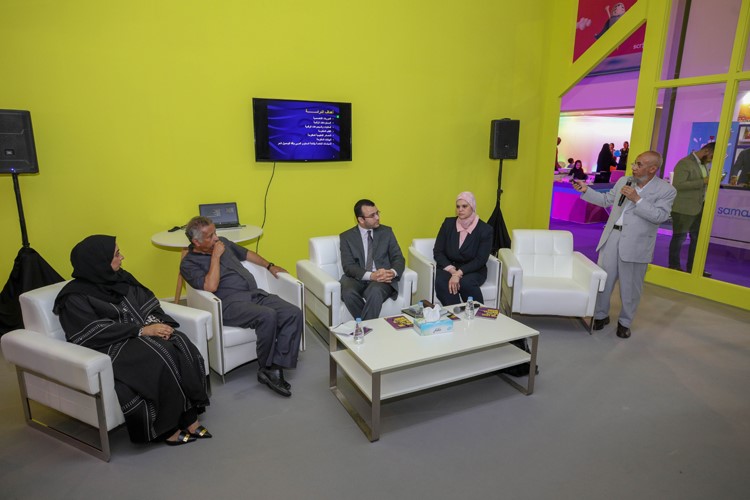Sharjah Libraries Launches the 21st Edition of ‘Sharjah Prize for Library Literature’ at Sharjah Children’s Reading Festival
 Date: - Apr 20, 2019
Date: - Apr 20, 2019 
Sharjah Libraries Launches the 21st Edition of ‘Sharjah Prize for Library Literature’ at Sharjah Children’s Reading Festival
Themed “Libraries of the Future: an outlook to the post digital era”
- The award highlights the information services provided by libraries of the future and how to build knowledge networks
- Eman Bushulaibi: the award paves the way to promote the role of libraries in the post digital era
Sharjah, 20 April, 2019
Sharjah Public Libraries of Sharjah Book Authority (SBA), launched the 21st edition of ‘Sharjah Prize for Library Literature’ under the theme “Libraries of the Future: an outlook to the post digital era”. The announcement was made during a forum ‘the future cultural planning policies’, held by Sharjah Public Libraries during the 11th edition of Sharjah Children’s Reading Festival, taking place in Expo Sharjah from 17-27 April, 2019.
Coinciding with the Sharjah World Book Capital 2019 celebrations, the award promotes the emirate’s position as a leading cultural hub across the Arab and Islamic World and globally. It also reflects the long-term cultural project Sharjah has been committed to implement for more than 40 years through effective partnerships with all government entities involved in digital transformation, smart services and based on approach that aims to engage all society members.
Attended by Eman Bushulaibi, Director of Sharjah Public Library and moderated by Dr. Omar Abdul Aziz, the session saw the participation of the winners of the last year’s edition of the award: Dr. Abdul Rahman Faraj, Dr. Nermine Ibrahim Al Labban and Dr. Ahmed Shehada.
Bushulaibi stressed that, the ‘Sharjah Prize for Library Literature’ has a forward-thinking approach that paves the way over the next twenty years to promote the role of libraries and information organizations in the post digital era and the new era of open access knowledge. It is a yet effort to address the cognitive challenges of the digital revolution.
She added: “The digital revolution has brought many transformations at all levels. It could shape the future lifestyle of individuals, especially in terms of seeking knowledge. Libraries and information organizations were affected by these transformations. They have become universal platforms for promoting education, creativity, innovation and experience. The essence of library activities in the post-digital era is now to provide public facilities and services to ensure that the right of every human being to open access to knowledge is fulfilled. "
She pointed out that the theme of this year’s edition of the award reflects the need for gradual transformation of libraries and information entities to contribute to the post-digital societies and be part of the online knowledge platforms, in terms of knowledge sources archiving and organization; information retrieval tools; and the availability of services. The main goal behind this is to help these entities achieve digital assimilation and cognitive integration, and contribute to smart transformation systems.” She concluded.
The award aims this year to explore the practices and experiences of libraries in the post-digital age in terms of knowledge framework, legislation, tools, practices and services, in addition to planning and forward-looking approaches. All contributions must be under the six pillars of the award.
These include: Information and Knowledge Services in the Libraries of the Future; Libraries of the Future as Platforms for Learning, Creativity and Innovation: Real Experiences; Information Services Engineering in the Digital Environment of Libraries of the Future; Security and Digital Rights Management in Libraries of the Future, Libraries of the Future and Knowledge Networks; in addition to technologies and smart applications for Libraries of the Future.
Dr. Abdul Rahman Farraj, Professor of Library and Information Science at Beni Suef University, explained his award-winning research papers: ‘Online Digital Arabic Content Available on Open (Free) Access Basis’. He said that he is optimistic about the future of open access model in the fields of archiving and publishing in the Arab world.
He stressed that institutions and individuals in the Arab World are able to meet the challenges of open access to information. Arab universities, for example, can provide their researches and studies online, and create a digital repository. He highlighted the need for educating and sensitizing researchers and leaders about the importance of ensuring access to scientific research and sources.
For his part, Ahmed Shehata, Professor, Department of Libraries and Information Science at the Minia University – Egypt, spoke about his research “Integration between Library and Information Science and other Sciences and their Role in Creating New Knowledge Resources”. He stressed the importance of developing the Arabic digital content in the field of libraries and other multimedia disciplines.
“The labour market has become increasingly dependent on new professions and interdisciplinary sciences that are generated through blending various disciplines. Those sciences can only be learned by individuals who were trained intensively. New education and training policies that incorporate those new sciences in the academic circles should be adopted to facilitate training and educating the new generations on those sciences,” he added.
Dr. Nermeen Ibrahim El-Labban, Professor, Department of Libraries and Information Science at Alexandria University – Egypt, discussed her paper themed “The Role of Partnerships: Nurturing the Value of Knowledge Generated by Heritage Digital Archiving Projects”.
El-Labban pointed out that the global trend is currently encouraging community members in general and particularly children to rely on documents and documentation as a primary and neutral source from which the information can be taken. She remarked that documents represent an instrumental source of information and knowledge, not only books that could be subjective and influenced by the author’s vision.



